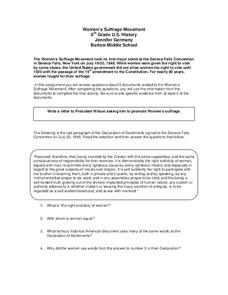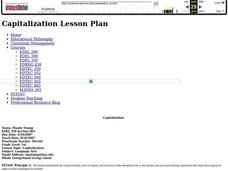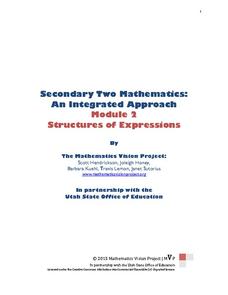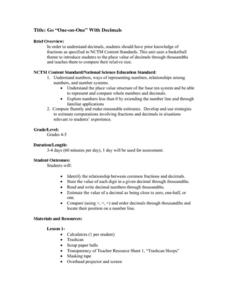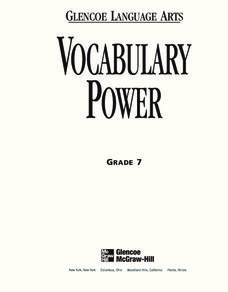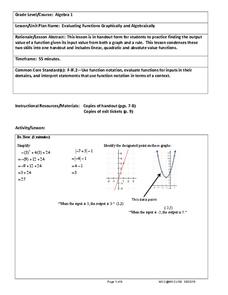Curated OER
Women’s Suffrage Movement
Though the movement for Women's Suffrage stretched over several decades and across two centuries, the final few years were the most difficult hurdle in many ways. Use a document-based question writing exercise to make inferences about...
Agriculture in the Classroom
A Rafter of Turkeys
How did that turkey get from the early Aztec culture to your table? Learn about the history of wild and domesticated turkeys in North America, as well as their inclusion in Thanksgiving traditions, with a two-part agricultural science...
What So Proudly We Hail
A Lesson on Benjamin Franklin’s “Project for Moral Perfection”
Benjamin Franklin identified 13 virtues that he felt would strengthen his character if he could focus on each one. A thorough lesson plan explores high schoolers' personal values in the context of their lives, and compels them to strive...
Curated OER
Capitalization
Teach your class the rules of capitalization with this fun, engaging lesson. Children participate in a learning activity, collaborate with peers, and practice their writing as they learn three specific rules: to always capitalize the...
Mathematics Vision Project
Structures of Expressions
This comprehensive unit investigates transformations of quadratics, having learners follow "Optima" through the development and growth of her quilting business. Deftly weaving the story into the mathematical mechanics, the unit gives...
Mathematics Vision Project
More Functions, More Features
Learners tackle a wide range of intimidating topics in this comprehensive unit that spans piecewise functions, absolute value of functions, and inverse functions (among other topics). Investigative group work alternates with more...
Museum of Tolerance
Family Tree Activity
Discover the family histories that make the classroom with a family tree activity. Scholars locate information about their family, construct a family tree, and work together to tally where family members are born.
Orlando Shakes
Julius Caesar: Study Guide
What makes a good leader? Use the curriculum guide for William Shakespeare's Julius Caesar to help scholars answer that question. Pupils research the play's historical context and other background information before engaging in...
National Security Agency
Go One-on-One with Decimals
Shoot and score with three basketball-themed lessons about decimals. Young mathematicians compare game statistics, make trash can hoops, and play a data spinner game to practice identifying digits and values within decimal numbers.
Baylor College
What's That Food?
Get things cooking with the first lesson in this series on the science of food. Working in small groups, young scientists make and record observations about different mystery foods. These descriptions are then shared with the class and...
School Improvement in Maryland
Types of Economic Systems
As an introduction to economics, government classes investigate different types of economic systems (traditional, command, market or capitalist, mixed) to determine answers to basic question about how goods are produced.
School Improvement in Maryland
Socio-Economic Goals of the Government
Equity. Increased productivity. Price stability. Environmental protection. Decreased poverty. Governments establish socio-economic goals and then must design and fund programs to address these goals. Groups investigate various programs...
EngageNY
Drawing a Conclusion from an Experiment (part 2)
Communicating results is just as important as getting results! Learners create a poster to highlight their findings in the experiment conducted in the previous lesson in a 30-part series. The resource provides specific criteria and...
Curated OER
The Use of Language in "I Know Why the Caged Bird Sings"
Readers of I Know Why the Caged Bird Sings are asked to craft an essay in which they compare how Maya Angelou uses figurative language to depict herself and Mrs. Flowers.
McGraw Hill
Vocabulary Power
Augment your language arts units with a set of vocabulary worksheets. The packet is an excellent support to your vocabulary instruction that covers a variety of skills, including context clues, Greek and Latin roots, reference materials,...
Museum of Tolerance
Making Lemonade: Responding to Oppression in Empowering Ways
An activity focused on tolerance encourages class members to consider how they might respond when they or someone else is the target of oppression and discrimination. After researching how some key figures responded to the anti-Semitism...
National Institute of Open Schooling
Adsorption and Catalysis
Adsorption, not absorption, is when atoms stick to the surface of an object, like water sticking to a grain of sand. An informative lesson delves into adsorption, teaching physical and chemisorption and the factors that affect them....
Cornell University
The Galvanic Cell Game
Play a little game with your classes! Young scholars expand on their understanding of oxidation/reduction reactions in a game-based activity. They build a Galvanic cell with game pieces while learning about each component and their...
Annenberg Foundation
Postwar Tension and Triumph
Go get the American Dream lifestyle! The 19th lesson in a 22-part series exploring American history shows learners the post-WWII economic boom. Using primary sources, photographs, and cartoons, groups discuss their findings and present...
Random House
Dear Mother Earth
Get those pencils ready because we are going to write a letter to our dear mother, Earth that is. Allow your youngsters to explore and express all the ways that they plan to protect Mother Earth. The worksheet is perfect for Earth Day,...
Achieve3000
Context Clues and Idioms
Kids practice using five types of context clues (definition, synonym, antonym, example, and general) to decode idiomatic language.
West Contra Costa Unified School District
Evaluating Functions Graphically and Algebraically
High schoolers evaluate functions graphically and algebraically. After completing that step, they write a statement describing the input and output.
Museum of Tolerance
Documents That Shape Society
The Bill of Rights is a foundational document of American democracy, much like the Nuremberg Laws were a foundational document of the Reichstag of Nazi Germany. But that's where their similarities end. Engage high schoolers in a...
Nosapo
Verbs: Regular, Irregular, Simple Past Tense
Adding -ed to the ends of most verbs can change a sentence to the past tense—but what about verbs like think or draw? Provide class members with practice activities that focus on both regular and irregular verbs in the simple past tense.


